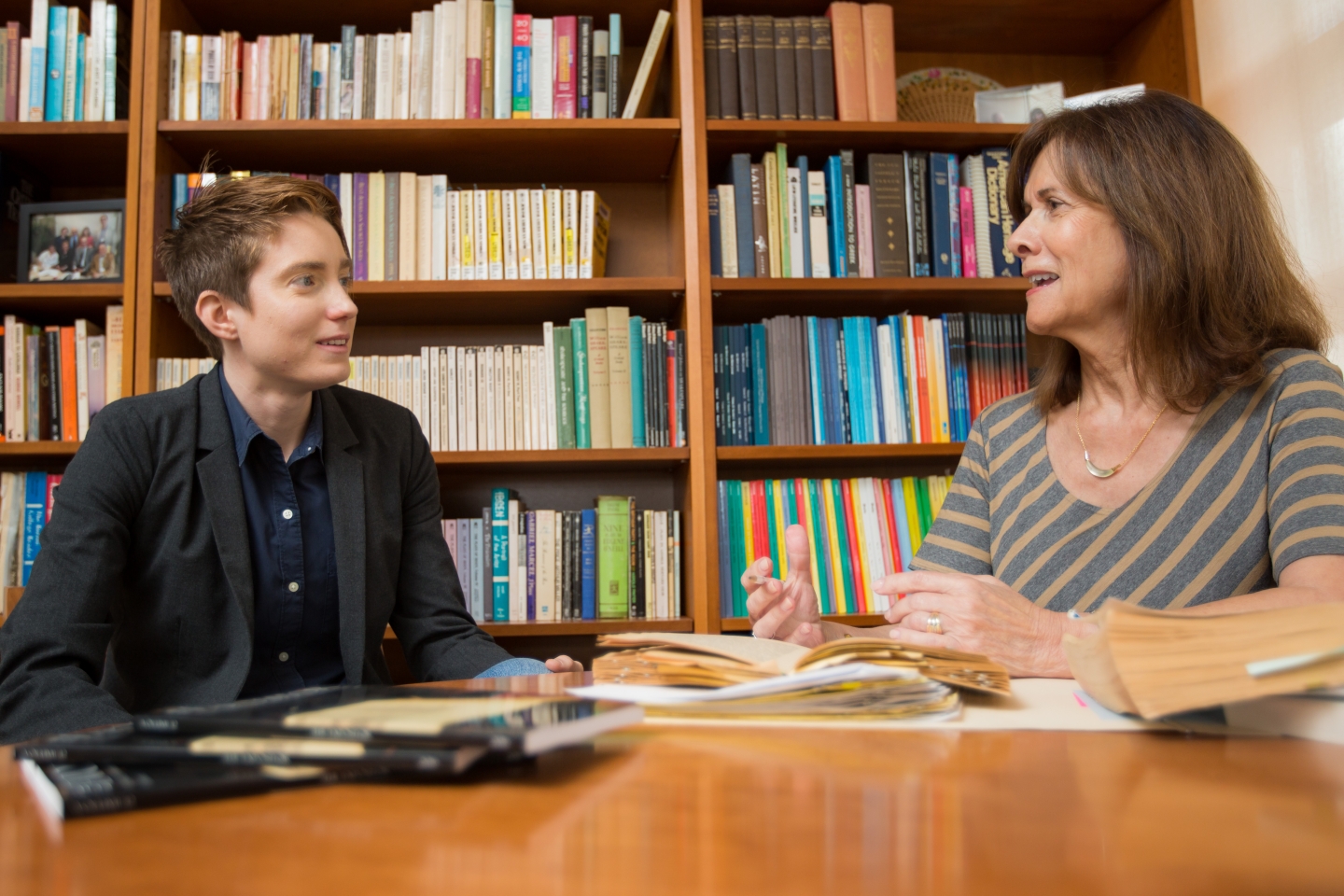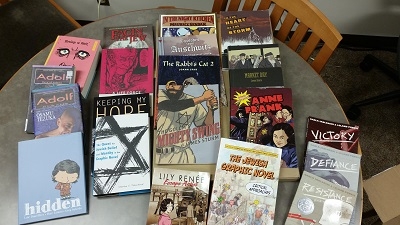In That Relative Silence: Edward Lewis Wallant’s The Pawnbroker
Abigail Baltuskonis and Dr. Victoria Aarons
Our research is part of a book-length project for Bloomsbury Publishers, Introduction to Holocaust Literature. The book, primarily aimed at an undergraduate audience, will cover fiction (novels, short stories, graphic novels), memoir, drama, and poetry, as well as address central issues in the study of Holocaust literary representation. I will organize the book around both genre and generational perspectives, moving from survivor writing to post-Holocaust literary approaches, examining the “language” of the Holocaust as it is recreated through a variety of structures and figurative designs. The book will consist of chapters arranged according to genre. We propose to complete the research necessary to write the initial draft of the chapter devoted to Edward Lewis Wallant’s groundbreaking Holocaust novel The Pawnbroker (1961). This chapter will address the silence in the aftermath of the Holocaust and the significance of the first Holocaust novel to have been published by an American Jewish writer.

Second-Generation Holocaust Narratives and the Intergenerational Transmission of Memory and Trauma
Olivia Mill and Dr. Victoria Aarons
Our research will contribute to a book-length project for Bloomsbury Publishers, Introduction to Holocaust Literature. The book, primarily aimed at an undergraduate audience, will cover fiction, memoir, drama, and poetry, as well as key issues and debates in the study of Holocaust literary representation, and will examine both survivor writing and post-Holocaust literary expression, examining the “language” of the Holocaust as it is recreated through a variety of structures and figurative designs. We propose to complete the research devoted to second-generation Holocaust literature, narratives written by the children of Holocaust survivors for whom the Holocaust is the central, defining and indelible shape of their identity. This chapter will suggest the ways in which second-generation narratives approach the task of bearing witness to the enormity of the Holocaust and the ways in which this pronounced event has shaped the lives of the direct descendants of those who experienced the trauma first-hand.
Illustrating the Holocaust: Graphic Novels
Madilyn Pflueger and Dr. Victoria Aarons
Our research on Holocaust graphic novels is part of a book-length project for Bloomsbury Publishers, Introduction to Holocaust Literature. The book, primarily aimed at an undergraduate audience, will cover fiction (novels, short stories, graphic novels), memoir, drama, and poetry, as well as key issues and debates in the study of Holocaust literary representation. I intend to organize the book around both genre and generational perspectives, moving from survivor writing to post-Holocaust literary approaches, examining the “language” of the Holocaust as it is recreated through a variety of structures and figurative designs. The book will consist of chapters arranged according to genre. We propose to complete the research necessary to write the initial draft of the chapter devoted to graphic novels. This chapter will suggest the range of expression through which the Holocaust is represented, demonstrating the ways in which graphic narratives challenge conventional forms of representation by making rupture mimetic.

Cinelatinidades: Gender, Sexuality, and Cinema in the Americas
Diana Chavarria, Megan Medrano, Cindi Marin with Dr. Dania Abreu-Torres, Dr. Rosana Blanco-Cano, Dr. Rita Urquijo-Ruiz
This interdisciplinary project will examine Latin American and U.S. Latina/o films that critically address issues of gender and sexuality, emphasizing the underexplored perspectives of women directors and queer cinematic identities from the 1990s to the present. Through the close examination of 20 films, we will reflect on how these productions critically deal with cultural discourses that either prevent or enable agency for women and queers within the Latin American and U.S. Latina/o contemporary film industries. In addition, we will closely examine visual styles that break with traditional male-centric visual conventions, thus proposing that cinema is empowering, through innovative visual language, groups that historically have been excluded. The three professors involved in this interdisciplinary project will bring unique academic perspectives to the project—Abreu-Torres (Caribbean cultural and cinema studies), Urquijo-Ruiz (Chicana feminisms, U.S. Latina/o studies and queer studies), Blanco-Cano (Latin American cultural and cinema studies, gender and queer studies). In addition, the three undergraduate students who will be part of this project will make rich contributions through the incorporation of critical points of communication studies and media interpretation. Each student will be working directly with a faculty member on the research and writing process of specific sections of the research project. That is, all the participants will have authorship over the project that, eventually, will be published as a full-length manuscript.

Chaucer in Print: Exploring Trinity’s 1721 Edition of The Works of Geoffrey Chaucer
Emily Wood and Dr. Andrew Kraebel
John Urry’s 1721 edition was the first attempt in over a century to return to manuscripts of Geoffrey Chaucer’s works and offer a new text, guided by recognizably critical priorities. No similar effort would be made until the nineteenth century, when editors in the newly-formed Chaucer Society took up Urry’s critical goals even as they denigrated his results. Thus belonging neither to the earlier tradition of Renaissance printings nor to the later critical tradition, Urry’s has been the least studied of all Chaucer editions. Yet it remains an important witness to early eighteenth-century literary scholarship, owing (for example) to the the care with which Urry identifies the manuscripts he has consulted, the detailed accounts of his rationale for accepting some previously unpublished works as authentically Chaucerian, and his lengthy new biography of the poet. Even more intriguing, Trinity’s copy of this rare edition contains numerous marginalia by an early owner, whose notes indicate that he compared his copy to some of the manuscripts named in Urry’s text. Our project will thus not only offer one of the first extensive explorations of this edition, but it will also recover how one specific copy was used by an apparently intelligent and well-positioned reader.

Inhabiting the FYE Peer Tutor Role: Learning and Leading in Community
Beverly Chatfield with Dr. Anne Graf & Sophia Abbot
Our project emerges from Trinity’s Pathways curriculum and continues national conversations about peer tutoring in higher education. In particular, we seek to understand the ways Trinity’s first group of FYE peer tutors supported faculty and first‐year students in FYE courses. Beginning in Spring 2016, we’ll employ a mixed‐methods research approach and an Appreciative Inquiry framework in order to address our research questions: What makes for a positive experience between peer tutors and their teaching faculty members? What has being a peer tutor taught tutors about themselves as learners? How have tutors helped first‐year students’ transition to college‐level academic work? With our student researcher in Summer 2016, we will analyze and contextualize our data, with the goal of a jointly‐authored publication as a result. In Fall 2016, we will move into an application phase, working to support next year’s FYE tutors.

Women Creating Comics
Katherine Groke and Robyn Wheelock with Dr. Jennifer Henderson and Dr. Aaron Delwiche
This unique project combines research, creative expression, and entrepreneurship to create a twenty-two page, color comic book that depicts college-aged female protagonists grappling with issues of power, gender, and justice. At the conclusion of the project, the comic book will be presented at a research conference and pitched to an independent publisher.

The Criminalization of Muslims in San Antonio During the 2016 Presidential Election
Iris Baughman, Hanna Niner, Matthew Long, and Savannah Wagner with Drs. Habiba Noor, Sarah Beth Kaufman, and William Christ
Presidential candidates use political rhetoric to garner popular support from constituents. In the current Presidential Election, candidates have presented one such appeal by constructing Islam as a “threat” to national security. The populous is strongly divided about the reality of this threat. Some argue that the threat is so great that Muslims as a group should be subject to increased policing and surveillance. The United States has a long history of demonizing minority groups: African-American men and undocumented immigrants, among others, have been targets of such campaigns in the past. Drawing on scholars who study this process of criminalization, we will conduct focus groups and qualitative interviews with community members in San Antonio – both Muslim and non-Muslim – to examine the ways in which Muslims are being actively imagined, spoken about, and behaved toward as if their religious beliefs, rather than their actions, make them criminals. Our research will capture this meaning-making in process.
This project grew into a play and theatre performance!

Sexuality in Santa Fe Fiesta
Georgina Cortinas and Dr. Amy Stone
This project is a qualitative sociological study of lesbian, gay, bisexual, and transgender (LGBT) visibility and participation in festivals in four cities of the South and Southwest, including Santa Fe Fiesta and San Antonio Fiesta. These cities have limited LGBT civil rights yet most have long, colorful traditions of LGBT integration into Fiesta events. Using interviews, historical research, and participant observation, we will study the way these urban festivals provide recognition for gay culture, the creation of new Southern and Southwestern queer cultural forms, and opportunities for LGBT visibility, and integration into city life that have significance beyond festival time.
Exploring Victim Accounts of Textual Harassment
Rachel Lawson and Dr. Erin Sumner
Textual harassment refers to a form of technology-enabled abuse in which individuals are harassed, stalked, or bullied via text-based short-messaging services (SMS). This project will use grounded theory and analysis of narratives to qualitatively explore the themes that are present in victims’ accounts of being textual harassed. Data will be drawn from the transcripts of eight focus groups in which victims of textual harassment discussed their experiences. The exact analytical focus will emerge from the data, but might illuminate some of the following topics: the relationship between the textual harasser and the victim; the role of technology in facilitating this form of harassment; victims’ perceptions of the harasser’s motives and the antecedents of the abuse; the outcomes (e.g., emotional, relational, social, and legal) of being harassed via text messaging.

Socializing North Korean Defectors in South Korea: Implications of Various Networks and Policies
Sabrina Sha and Elena Wilson (Murchison Fellow) with Dr. H.J. Yoo
Our research project focuses on how various South Korean social and political networks play a role in socializing North Korean defectors. Having escaped from one of the most isolated and repressive states on the planet, the vast majority of North Korean defectors settle in South Korea. However, without proper experience in capitalist and democratic systems, they confront a number of difficulties adapting to society with respect to finding jobs, securing housing, getting education, and learning a new culture. The increase of North Korean defectors since the early 1990s demands a variety of groups be involved in the process of socialization. These include diverse institutions run by the central government, provinces, municipalities, and non-governmental organizations (NGOs), such as Christian and Buddhist groups. In this project, we seek to examine how the government agencies and NGOs design and implement programs and how they proactively respond and adjust their programs to the demands of North Korean defectors. We will also evaluate the program outcomes and examine whether or not there exists any inequality embedded in the current programs.

The Ontology of Videogames
Daniel Conrad and Dr. Andrew Kania
Dr. Andrew Kania and Daniel Conrad will be investigating the ontological nature of videogames and gameplay, particularly in comparison with established artforms. Dr. Kania will focus on (i) whether videogame players perform the games they play, in the sense that musicians perform musical works, and (ii) whether players are “narrators” of the events that occur in their gameplay, in the sense in which a novelist tells the story of the novel she writes. Daniel Conrad will focus on distinct, but related issues, in particular the implications of the fact that (some) videogames are games for (i) their status as art, and (ii) the nature of gameplay as for an audience (arguably a crucial aspect of both performance and storytelling).

Developing a Diversity Profile for the City of San Antonio
Benjamin Collinger and Dr. Simran Jeet Singh
The purpose of the project is to build relationships with faith-based leaders and organizations, specifically from among underrepresented religious communities, including Muslims, Hindus, Buddhists, and Sikhs. The project will culminate in a "white paper” assessing inclusion in San Antonio, and make recommendations for long-term programming.

The History of Blue
Sasha (Alexandra) Faust and Professor Jessica Halonen
In an 18th century Berlin laboratory, a dye maker developing a new red pigment borrowed a contaminated compound from a colleague, which resulted in what we now call Prussian blue. Prior to this, blue pigment was rare made from lapis lazuli imported from Afghanistan, this new synthetic pigment became a sensation. By the mid-18th century, this accidental discovery created a notable shift in the palette used by artists in Europe and Japan. In addition to its continued use by artists as a pigment, Prussian blue has been used in a wide range of applications, including in photography, biomedical and renewable energy fields. Through both traditional historical investigation and artistic practice (experimentation with materials and artistic production), this project will explore the changing role of the color blue from the medieval through modern period (circa 1945), the cultural significance of an accidental discovery, and the intersection between the arts and sciences.

Exploration into Contemporary European Physical Theater Techniques: An American in Italy
Jacob Pursell and Professor Roberto Prestigiacomo
Between June and July 2016, Prof. Prestigiacomo has been invited to participate at the Festival Laboratory of Theatre Practice (F.L.I.P.T.) in Fara Sabina, Italy. During the festival, he will be presenting to a group of international theatre practitioners the work that Teatro Potlach conducted at Trinity University during their Stieren Guest residency in September 2015. Additionally, he will be part of an international panel discussing the practices applied during the Trinity residency of Teatro Potlach, and he will be presenting his research in the field of theatre directing. He will also co-direct with the artistic director of Teatro Potlach and the other two international directors an installation of the Invisible Cities Project in Fara Sabina. The purpose of this project is to share and experience theater techniques and experiences on an international scale. During the festival, student Jacob Pursell will shadow Prof. Prestigiacomo's events and presentations, and will participate in all of the festival workshops led by international theatre practitioners. He will study the differences and similarities between the international theatre techniques that he encounters at the festival and the acting techniques he has experienced at Trinity University in order to suggest an international technique for teaching acting.
